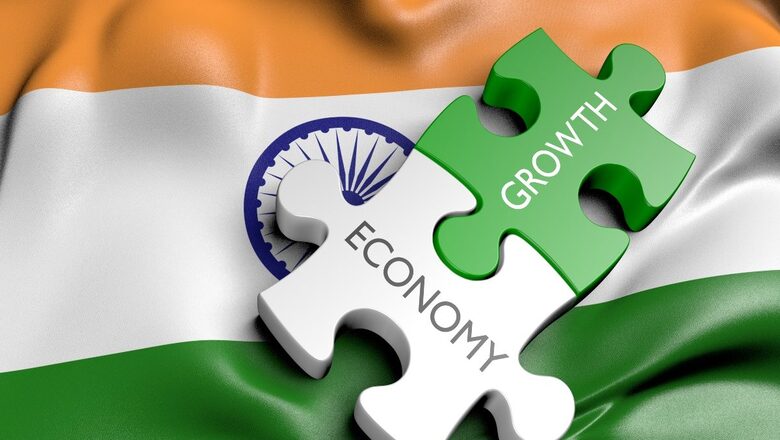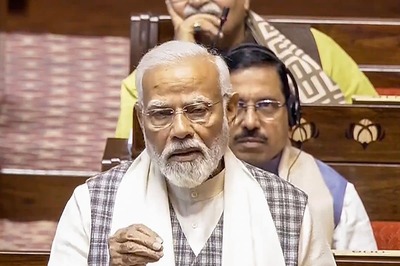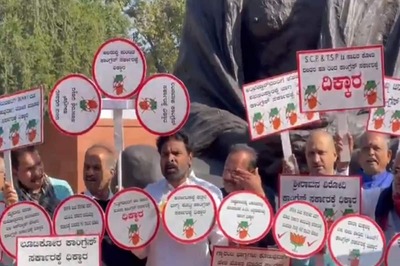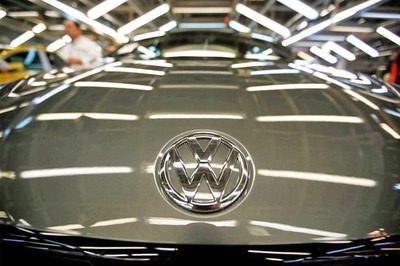
views
India was not supposed to be a success story. China, yes. Western think tanks knew as far back as the 1990s that the Communist giant would, as one recent book (The World in 2050: How to Think About the Future) by Hamish McRae put it, claim its rightful place in the world.
But India? It was a colony. It was not meant for greatness. It was poor, chaotic and unmanageable. How on earth is a country, where millions still live in poverty, suddenly going to be the third-largest economy in the world by 2027?
The Western elite didn’t believe India had it in her to succeed. After all, the West had lifted itself out of relative poverty in the 1500s and into great wealth by the 1900s through colonial conquest, transatlantic slavery, and the occupation of two continents, the Americas and Australia.
India hadn’t done any of that. Instead, it had survived economically ruinous colonisation, indentured labour, and foreign atrocities for centuries.
The West acquired wealth at the expense of Asia and Africa. Its great institutions of learning, from Oxford to Harvard, benefitted from the resources that flowed from the Industrial Revolution. Science fuelled industrial growth. But so did tax revenues extorted from the colonies. Free land usurped in the Americas and Australia and free slave labour shipped from Africa completed the West’s business model: land, labour and lucre.
How could such a business model lead to anything but prosperity? Through the 1800s and 1900s, the West steadily grew rich.
Extrapolating economic historian Angus Maddison’s estimates, the average Englishman in 1500 had a per capita income (measured in 1990 US dollars) of around $600. The average Indian, in pre-Mughal, pre-British India in 1500, had a similar per capita income of $550.
By the end of British rule in 1947, the average Englishman had a per capita income of $7,000. The average Indian in 1947, after 190 years of British colonial rule, had a per capita income of $60.
From near parity in the 1500s, the average Indian had sunk in the mid-1900s to 1/100th the wealth of the average Englishman.
How could a country that had been reduced to penury by colonial rule rise to great power status? Of course, it couldn’t.
That was the accepted thesis in the West. It was of course privately accepted that its own prosperity was partly, perhaps largely, based on invasive colonialism, slavery and the permanent occupation of others’ continental territories in the Americas and Australia.
But that acceptance was rarely publicly acknowledged. The Palestinian-American writer Edward Said, a critic of the postcolonial Western narrative, was quickly discredited by the powerful Anglophone media. The moment Shashi Tharoor’s 2017 book exposing Britain’s cruel, thieving empire was published internationally, the West swung into action with a counter-narrative.
But the truth has an inconvenient habit of bursting through. In the United States, Senator Elizabeth Warren began a debate on paying slavery reparations to the 42 million African-Americans who are descendants of African slaves shipped across the Atlantic Ocean by European, mostly British, slave traders from Africa to North America for over 200 years.
Rattled, British apologists of colonialism and slavery launched subtle counter-attacks. Historians like Niall Ferguson, an apologist, wisely kept silent allowing non-historians like Nigel Biggar to mount a defence of colonialism and slavery.
Biggar is an Anglican priest. He was Regius Professor of Moral and Pastoral Theology at Oxford University from 2017-2022. His 2023 book Colonialism: A Moral Reckoning (the manuscript was rejected by Bloomsbury before finding a saviour in HarperCollins) argues that Britain did Asia and Africa a favour by colonising them.
Historian Alan Lester, a professor at the University of Sussex, has engaged Biggar in a long academic debate on Biggar’s central thesis. Professor Lester writes: “Biggar consistently presents African people as unfit to govern themselves; as requiring British rule for their own sakes — even to the extent of repeating slave-owners’ original arguments against emancipation: ‘Can we be sure that [descendants of enslaved people] would have been better off had their ancestors remained in West Africa — some as slaves and sacrificial funeral fodder?’ Biggar’s methods of establishing the necessity for British rule in Africa include frequent, seemingly innocuous asides, which have the cumulative effect of reinforcing tropes of African savagery.
“Biggar does not see himself, or the liberal imperialists whom he defends, as racist, because they do not believe Black or Brown peoples are biologically inferior to White people. They simply ‘observe’ that these people’s cultures were backward compared to that of the British and other Europeans. By Biggar’s definition, the attribution of ‘cultural inferiority to a lack of development, rather than biological nature’ is not racist. Failing to acknowledge everyday colonial racism is like examining Nazi Germany without the antisemitism, or modern Russia without the communism. Racism was a ‘common sense’ belief system that fundamentally underpinned the British Empire, and it is deeply concerning, to me at least, that there is now such an appetite to deny this with semantic differences between ‘race’ and ‘culture’.”
The Anglospheric establishment, including embedded media like The Economist, has grudgingly recognised India’s emergence as a leading power. But it cannot bring itself to acknowledge that India is emerging to power from poverty imposed on her for 190 years by systematic colonial economic abuse.
Such an admission would reveal the shame the West feels — but does not publicly acknowledge — about its history. The rise of India without resorting to the crimes of colonialism and slavery that made the rich world rich is a bitter pill to swallow.
The writer is an editor, author and publisher. Views expressed are personal.



















Comments
0 comment